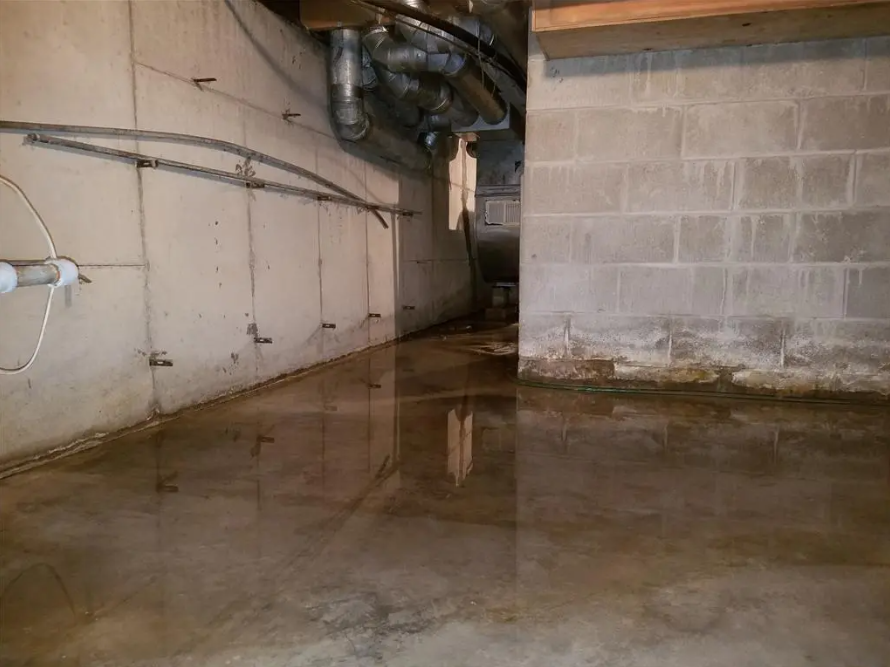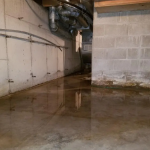Water in the Basement: Causes and Solutions
A wet basement can be a homeowner’s nightmare, causing not only structural issues but also creating an environment conducive to mold growth and compromising the overall health of your home. Understanding the causes of water in the basement is the first step toward effective prevention and mitigation. In this comprehensive article, we will explore the common reasons behind water intrusion, the potential consequences, and proactive solutions to keep your basement dry and your home healthy.
Common Causes of Water in the Basement:
Poor Grading:
Improper grading around your home is a frequent culprit when it comes to basement water issues. If the slope of the ground directs water toward the foundation instead of away from it, rainwater and melting snow can accumulate around the base of your home, increasing the risk of water seeping into the basement.
Inadequate Drainage Systems:
A lack of proper drainage systems, such as gutters and downspouts, can contribute to water problems in the basement. Gutters that are clogged or not effectively directing water away from the foundation can lead to water pooling and potential infiltration.
Foundation Cracks:
Cracks in the foundation walls or floor are direct entry points for water. Over time, natural settling, shifts in soil, or external pressures can cause cracks to develop. Even small cracks can allow water to seep into the basement, leading to dampness and potential flooding.
Sump Pump Failure:
A sump pump is a vital component of many basement waterproofing systems. It helps prevent flooding by pumping excess water away from the foundation. If the sump pump fails or is overwhelmed during heavy rains, it can result in a flooded basement.
Hydrostatic Pressure:
Hydrostatic pressure occurs when the soil surrounding the foundation becomes saturated with water. The pressure from this water can force its way through any cracks or vulnerabilities in the foundation, leading to water infiltration.
Window Well Issues:
Window wells, especially those below ground level, can become filled with water during heavy rain or due to poor drainage. If the window well is not properly sealed or lacks a functioning drainage system, water can easily find its way into the basement.
Clogged or Blocked Foundation Drains:
Foundation drains are designed to collect and redirect water away from the foundation. If these drains become clogged or blocked, water can accumulate around the foundation, increasing the risk of basement flooding.
Surface Water Runoff:
The slope and landscaping around your home play a crucial role in preventing water from running toward the foundation. If surface water runoff is not effectively managed, it can contribute to basement water issues.
Potential Consequences of Water in the Basement:
Mold and Mildew Growth:
Damp and humid conditions in the basement provide an ideal breeding ground for mold and mildew. These fungi not only pose health risks but can also compromise indoor air quality.
Structural Damage:
Persistent water infiltration can lead to structural damage to the foundation and other components of your home. Over time, this damage may weaken the overall structural integrity.
Damage to Belongings:
Basements often serve as storage spaces for valuable belongings. Water damage can ruin furniture, electronics, family heirlooms, and other possessions stored in the basement.
Health Issues:
Mold and mildew growth can release spores into the air, potentially causing respiratory problems and exacerbating allergies. Damp conditions in the basement can also attract pests that contribute to health issues.
Decreased Property Value:
A history of water issues in the basement can negatively impact the resale value of your home. Potential buyers are likely to view water problems as red flags, leading to decreased market value.
Proactive Solutions for a Dry Basement:
Proper Grading:
Ensure that the ground around your home slopes away from the foundation. This promotes proper water runoff and reduces the risk of water pooling around the base of your home.
Effective Drainage Systems:
Install and maintain gutters and downspouts to direct rainwater away from the foundation. Additionally, consider adding extensions to downspouts to ensure water is discharged well away from the home.
Foundation Sealing:
Regularly inspect the foundation for cracks and seal any vulnerabilities. Waterproof coatings can be applied to the exterior walls to provide an additional barrier against water infiltration.
Sump Pump Maintenance:
Regularly check and maintain your sump pump to ensure it is in good working condition. Consider installing a backup sump pump to provide protection in case of pump failure.
Window Well Maintenance:
Ensure that window wells are properly sealed and have functional drainage systems. Consider covers to prevent water accumulation during heavy rain.
Clear Foundation Drains:
Regularly inspect and clear foundation drains to prevent clogs. This ensures that water is effectively redirected away from the foundation.
Landscaping Considerations:
Pay attention to landscaping around your home. Avoid planting large shrubs or trees close to the foundation, as their roots can impact the integrity of the foundation and create pathways for water.
Interior Waterproofing:
Implement interior waterproofing measures, such as installing a drainage system along the interior perimeter of the basement, to collect and redirect water. This may include the use of a French drain or a footing drain.
Crawl Space Encapsulation:
If your home has a crawl space, consider encapsulating it to create a moisture barrier. This involves sealing the crawl space, installing a vapor barrier, and ensuring proper ventilation.
Regular Inspections:
Conduct regular inspections of your basement for signs of water intrusion. Early detection allows for prompt intervention and prevents issues from escalating.
Water in the basement is a common issue that, if left unaddressed, can lead to a myriad of problems affecting both the structural integrity and health of your home. Understanding the causes and potential consequences empowers homeowners to take proactive measures to prevent water infiltration. Whether through proper grading, effective drainage systems, or interior waterproofing, a dry basement contributes to a healthier living environment, preserves property value, and ensures the longevity of your home. Regular maintenance and vigilant attention to potential vulnerabilities are key to keeping your basement dry and your home safe.
Contact the Professionals at Everdry Waterproofing of Greater Grand Rapids Today! (800) 275-7910



















